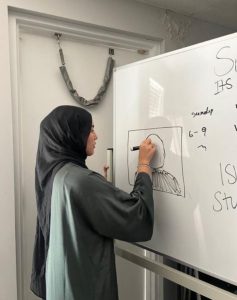There is a delicate art to teaching Islam an art many people intend to master, but few approach with the tenderness it truly requires. The goal of guiding someone in faith is never to break their spirit or shame them into obedience. Faith grows the way flowers grow: with warmth, with patience, and with careful, consistent light.
Islam teaches transformation, not intimidation. The Prophet Muhammad ﷺ didn’t walk through society crushing people’s mistakes; he walked through it awakening their potential.
Start With Mercy Before Instruction
Allah describes the Prophet ﷺ as “a mercy to the worlds.” Mercy was not his method it was his character. He corrected with gentleness, carried the burdens of others on his shoulders, and never chased people away with harshness. If mercy shaped his teaching, it must shape ours.
When someone is struggling with their prayers, their modesty, their habits, or their spiritual discipline, the instinct should never be to lecture. The instinct should be to lift. To show them what they can become rather than condemning them for where they currently are.
Speak to Hearts, Not Just Minds
Faith is not mechanical. A human being does not change by memorising rules alone. They change when their heart feels safe enough to blossom. When you speak to someone about Allah, speak in a way that expands their heart, not closes it.
Remind them of Allah’s mercy, not His wrath. Remind them that He welcomes repentance, He answers every sincere whisper, and He knows the sincerity hidden behind their effort even the small ones.
When people feel valued, they begin to value themselves. And when they value themselves, they naturally begin to value their relationship with Allah.
Correct Without Crushing
Correction is necessary, but the way it is delivered determines whether a person grows or collapses. The Prophet ﷺ corrected mistakes in ways that protected a person’s dignity. Sometimes he spoke in private. Sometimes he corrected gently, saying, “Perhaps it would have been better if…” instead of shaming or exposing people publicly.
Teaching faith should mirror this prophetic gentleness. A gentle correction plants seeds. A harsh correction uproots the entire garden.
Celebrate Progress, Even When It’s Small
Guiding others in faith requires the ability to see the beauty in small steps. A person who begins praying one prayer a day is not failing they’re beginning. Someone who lowers their gaze today after struggling yesterday is not weak they’re trying.
Encouragement is a spiritual nutrient. It strengthens. It motivates. It keeps the soul hopeful instead of defeated.
Teach With Hope, Not Fear
Fear may change behaviour momentarily, but hope changes behaviour permanently. People stay close to Allah when they believe He wants them near. They turn away when they believe they’ve already failed.
The message should always be:
“Allah wants you. Allah sees you. Allah honours your effort, even the effort no one else sees.”
Hope brings people back to the masjid. Hope brings them back to the Qur’an. Hope brings them back to Allah.
Lead By Example, Not Injury
Your character is your strongest da’wah. People learn more by observing your humility, your patience, your kindness, and your sincerity than they will from a hundred admonitions.
To build people up, you must be a builder yourself steady, gentle, and consistent. A person who makes others feel safe around Islam gives them the courage to return again and again.
A Final Reminder
Guiding someone is an amanah. It is a trust from Allah. And the same Lord who can guide hearts through your words can also turn hearts away because of your harshness. You never know who might hold onto Islam simply because you handled their soul with softness.
Teach faith the way the Prophet ﷺ taught it with kindness, with love, with understanding — and you will find that people not only listen, but flourish.
When you build someone up, you don’t just change their faith. You change their future. And the reward for that is written in the unseen in ways only Allah can measure.


